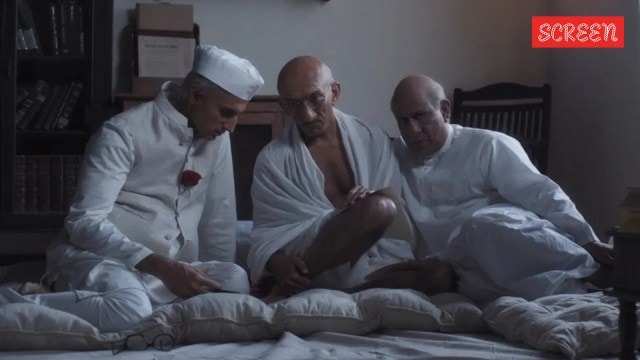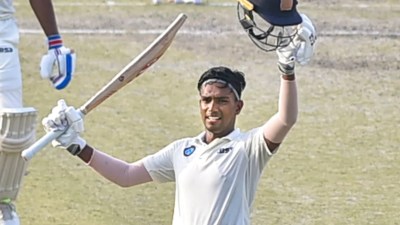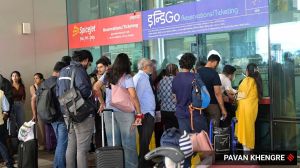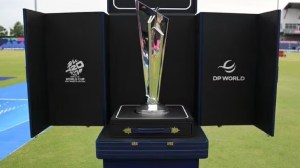Click here to follow Screen Digital on YouTube and stay updated with the latest from the world of cinema.
Freedom At Midnight review: A relatable, racy-pacy account of build-up to India’s tumultuous independence
Freedom At Midnight review: Sprawling yet pacy, the Nikkhil Advani series brings to life the story of India, and Pakistan, which came into existence at that stroke of the midnight hour immortalised in the haunting words of Nehru.
 Freedom At Midnight review: The story of India, and Pakistan, which came into existence at that stroke of the midnight hour immortalised in the haunting words of Nehru, is still being written.
Freedom At Midnight review: The story of India, and Pakistan, which came into existence at that stroke of the midnight hour immortalised in the haunting words of Nehru, is still being written.The choice of using ‘Freedom At Midnight’, Larry Collins and Dominique Lapierre’s account of the tumultuous build-up to India’s independence in August 1947, as the basis for the seven-part web series of the same name achieves one thing above all else: adapting from source material which has been in existence for several years, especially from the celebrity author duo who couldn’t be accused of being either pro-India, or pro-Pakistan, frees creator and director Nikkhil Advani of being accused similar bias.
Or, let’s say, it should. But revanchism hangs heavily in the air, and history is being revised and re-written, as we speak, so any interpretation is up for being challenged. The disclaimer adds, for good measure, that it has also been based on and ‘inspired by real-life events gathered through extensive research across credible public accounts, historic facts and news articles’.
Plus, we are warned about the makers of the series having taken ‘creative liberty’ in certain parts, as well as some bits being fictionalised because the series is ‘not a documentary, and is not intended to accurately reflect those incidents that may have occurred.’ Right, we get it: these excessive, near-contradictory clauses are needed even when addressing events which have been well-documented, and comprehensively peer-reviewed.
If there’s one thing that Collins and Lapierre can be accused of is that their racy, pacy writing style turns one of the most violent, difficult partitions of a land into an easily digestible socio-political thriller, which flattens the complexity and nuance of the subject. That, and the distinct bent towards Mountbatten, the last Viceroy of India who presided over the last few months of the British Raj, helping carve the region on religious lines.
Given the polarised, ‘post-truth’ times we live in, I’m sure there will be as many arrows slung at the omissions and commissions in the series. Condensing a thousand plus pages into seven episodes of 40-45 minutes necessitates a pruning, and a point-of-view: you can see the attempt at balance and objectivity, but no quarters are given when portraying Jinnah (Arif Zakaria) as an adamant-beyond-reason, insecure individual who is shown being eaten up by his desire to be seen ‘equal’ if not greater than Gandhi (Chirag Vohra) and Nehru (Sidhant Gupta).
I read the book many years back, pretty much as I’d read the authors’ other books as pop history entertainers, and don’t remember finding anything too offensive given the genre, except for their clear White-washing the role of Mountbatten, whom they evidently admired a great deal, and whose meticulous and exhaustive note-taking helped them in their research while working on the volume. If I recall correctly, they also used the words ‘dark-skinned’ for ‘natives’: they also termed Indira Gandhi ‘fair’ at one point in their introduction, without the least shred of irony.
ALSO READ | Why Pakistan celebrates Independence Day on August 14, and India on August 15
Lapierre and Collins may not have been British, but they are very clearly Anglophones. Getting our people back into our own history, or rather, histories, and putting Mountbatten and his machinations where they belong, is the burden of the series. And it does succeed, to a large extent, at putting the record straight, seen from the eyes of those who were fighting for freedom, rather than those who were forced to give it, even if it comes off not as profound as it could have. But then, the book itself is patently not aiming for profundity: it’s easy readability can be seen in the series’ attempts at making itself relatable to an audience which has byte-sized attention spans
The scale of the operation, which the leaders of the Congress tried to stave off till the very last moment, was staggering: drawing a line between rivers, fields, forests, deserts, mountains, created India, with West Pakistan and East Pakistan on either side. Jinnah, who refused to budge from his demand of an independent nation for Muslims, called it a ‘moth-eaten Pakistan’, but had to be content with the way the colonisers, loath to give up their booty (that they hoped the newly created nation could agree to ‘dominion’ status’ under the Crown is made clear all over again), gave him what he wanted.
By the end of the first episode, it’s clear that Advani and his team of writers are going to tell us this story mainly in a series of conversations between the chief dramatis personae: there’s Nehru and Patel and Gandhi and the others in the Congress on one side, and there’s Muslim League’s Jinnah, and his compatriots Liaquat Ali Khan (Rajesh Kumar) and Huseyn Suhrawardy (Anuvab Pal) on another, with the Sikhs and other players in between.
While re-creating all events would have been far too unwieldy for the format (there are a few exceptions, like the Chauri Chaura ‘kaand’ and the devastating Noakhali riots, among others), the series of conversations does make things static, especially when the actors adopt their favourite stance of facing front and speaking to the camera, with their companions behind them.
Then, of course, there is the insistent background music — my top bugbear — which is so loud that it threatens to drown out both the dialogues as well as the staging. It got to the point where I literally fell upon with relief on the few portions which have the courage to dispense the bgm.
This is an interesting ensemble, with no attempt made to use big stars to play familiar characters: what, no Rajit Kapur as Nehru? But the choice of a few actors makes things uneven. However adept the very talented Sidhant Gupta (so right in ‘Jubilee’) may be in looking and sounding remarkably like Pandit Nehru, with his khadi achkans and the red rose, he cannot escape the fact that he is a twenty something playing a sixty something.
Zakaria is excellent as Jinnah; in fact, this may be his best role in many years. McGibney and Bugeja, as the Mountbatten couple, trying hard to fair to those they are leaving behind, are good too, with just a hint at the colourful view of the purported closeness of Nehru and Edwina.
As Gandhi, Chirag Vora, most excellent in ‘Scam 93’, is again a terrific lookalike, but his delivery is underlined. It could well be that playing Gandhi automatically gives you a free pass into dhoti-lathi-and-sing-song-speech territory, but the curve of his nose stays distracting all the way through. KC Shankar as V P Menon has a juicy part, and he makes the most of it; Malishka Mendonsa as Sarojini Naidu comes off as a Delhi lady-about-town in her tasteful Emporium saris; Ira Dubey, who makes up another rare female character in this all-male party, is far too youthful, despite her artfully crimped-and-grey hair, to become Jinnah’s loyal sister-and-companion.
ALSO READ | Dominique Lapierre and his deep bond with India
The one actor standing head and shoulders above everyone else is Rajendra Chawla who fully embodies Sardar Patel. He has been written strongly and clearly, and through the telling of this tale, he comes off the true architect of modern India, surpassing both Nehru, who had to put his fealty aside to give Bapu the ultimatum (if you cannot come with us, do not stand in our way), and the Mahatma himself, who cannot walk past past his abiding sadness at the imminence of Partition.
Despite its problems, I’m glad that the series exists. The story of India, and Pakistan, which came into existence at that stroke of the midnight hour immortalised in the haunting words of Nehru, is still being written. It was a fraught freedom, with millions losing their lives and their livelihoods on either side of the newly-formed border, drawn in blood. The questions — what that hard-fought freedom has come to mean, and how free are we really — are still blowing in the wind.
Freedom At Midnight cast: Sidhant Gupta, Chirag Vohra, Rajendra Chawla, Luke McGibney, Cordelia Bugeja, Arif Zakaria, Ira Dubey, Malishka Mendonsa, K C Shankar, Rajesh Kumar, Pawan Chopra, Anuvab Pal, Khurshed J Lawyer, Shreya Nair, Urvashi Dubey, Andrew Cullum
Freedom At Midnight director: Nikkhil Advani
Freedom At Midnight rating: 2.5 stars
- 01
- 02
- 03
- 04
- 05


































